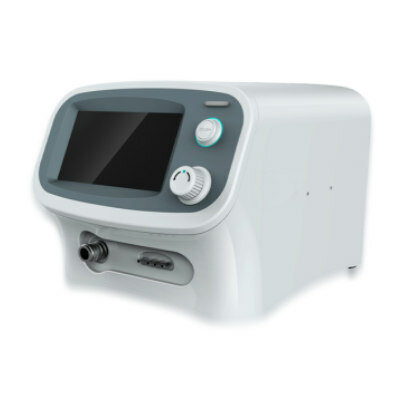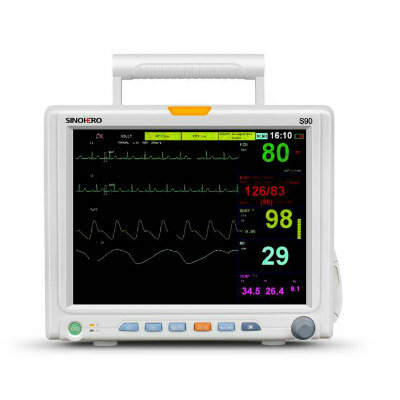Human-Machine Collaboration to Redefine Healthcare Market in 2018
|
By HospiMedica International staff writers Posted on 26 Dec 2017 |

Image: The gap between AI and humans is expected to be bridged in 2018 through a collaboration of humans and machines (Photo courtesy of Techora).
Human-machine collaboration will bridge the gap between artificial intelligence (AI) and humans in 2018, leaving aside the man versus machine competition. Non-traditional players such as Amazon, Apple, Google, and IBM will start having a tangible impact on the healthcare ecosystem. Competing outside their conventional arena, these organizations are pushing traditional healthcare companies to break their main business model and make healthcare more accessible, affordable, and consumer-centric.
These were some of the expert insights offered at Frost & Sullivan’s (Santa Clara, CA, USA) Growth Innovation Leadership (GIL) briefing titled, "Global Healthcare Market Key Predictions for 2018" held on December 13, 2017. Frost & Sullivan's experts have predicted another year of big disruptions, transformations and innovations as the healthcare industry continues to overhaul outmoded business models. Advances in areas ranging from cancer immunotherapy products to blood testing, as well as the convergence of cutting-edge technology such as AI and blockchain, will help shape the healthcare industry into a much-anticipated, value-based care paradigm.
2018 is expected to be a tipping point for the mainstream adoption of popular digital health tech/solutions (AI, mHealth/wearables, telehealth, Big Data analytics, and robotics) and the transition of noble technologies from research/proof-of-concept to actionable healthcare and clinical applications (blockchain and cancer immunotherapy products). Additionally, cloud-based PaaS/SaaS platforms will become integral to any healthcare data monetization model, and the transition of these technologies from ideation to actionable applications will drive growth opportunities across the world.
Furthermore, data monetization will unleash the power of patient data to achieve better outcomes across the healthcare value chain. The digital transformation of patient monitoring, coupled with data hubs using cell phone networks, will drive health revenue, thereby further reducing hospital inpatient census. There will be increasing awareness about the current inefficiencies in healthcare delivery, such as poor utilization of operating theaters. There will be high demand for optimization of resources, care coordination employing technology-based platforms, and products or services that improve the efficiency of healthcare delivery. Highly capitalized players such as Amazon, Alibaba, and Google will reshape whole segments of healthcare, revolutionizing and simplifying patient experiences and patient empowerment.
"Algorithms have outperformed humans in many cases. In 2018, the work of AI will begin to see fruition particularly in the diagnostic imaging market. Therefore, clinicians will start embracing this technology and use it more freely and easily," said Reenita Das, Partner, and Senior Vice President of Transformational Health at Frost & Sullivan.
"Blockchain technology will move from perceived hype to reality bandwagon demonstrating real value with initial commercial deployments across health insurance claim adjudication and revenue cycle management use cases. The debate will now move onto the topic of adoption, exploring [how] and [where] can blockchain technology be used in the healthcare space," added Kamaljit Behera, Industry Analyst, Visionary Healthcare at Frost & Sullivan.
Related Links:
Frost & Sullivan
These were some of the expert insights offered at Frost & Sullivan’s (Santa Clara, CA, USA) Growth Innovation Leadership (GIL) briefing titled, "Global Healthcare Market Key Predictions for 2018" held on December 13, 2017. Frost & Sullivan's experts have predicted another year of big disruptions, transformations and innovations as the healthcare industry continues to overhaul outmoded business models. Advances in areas ranging from cancer immunotherapy products to blood testing, as well as the convergence of cutting-edge technology such as AI and blockchain, will help shape the healthcare industry into a much-anticipated, value-based care paradigm.
2018 is expected to be a tipping point for the mainstream adoption of popular digital health tech/solutions (AI, mHealth/wearables, telehealth, Big Data analytics, and robotics) and the transition of noble technologies from research/proof-of-concept to actionable healthcare and clinical applications (blockchain and cancer immunotherapy products). Additionally, cloud-based PaaS/SaaS platforms will become integral to any healthcare data monetization model, and the transition of these technologies from ideation to actionable applications will drive growth opportunities across the world.
Furthermore, data monetization will unleash the power of patient data to achieve better outcomes across the healthcare value chain. The digital transformation of patient monitoring, coupled with data hubs using cell phone networks, will drive health revenue, thereby further reducing hospital inpatient census. There will be increasing awareness about the current inefficiencies in healthcare delivery, such as poor utilization of operating theaters. There will be high demand for optimization of resources, care coordination employing technology-based platforms, and products or services that improve the efficiency of healthcare delivery. Highly capitalized players such as Amazon, Alibaba, and Google will reshape whole segments of healthcare, revolutionizing and simplifying patient experiences and patient empowerment.
"Algorithms have outperformed humans in many cases. In 2018, the work of AI will begin to see fruition particularly in the diagnostic imaging market. Therefore, clinicians will start embracing this technology and use it more freely and easily," said Reenita Das, Partner, and Senior Vice President of Transformational Health at Frost & Sullivan.
"Blockchain technology will move from perceived hype to reality bandwagon demonstrating real value with initial commercial deployments across health insurance claim adjudication and revenue cycle management use cases. The debate will now move onto the topic of adoption, exploring [how] and [where] can blockchain technology be used in the healthcare space," added Kamaljit Behera, Industry Analyst, Visionary Healthcare at Frost & Sullivan.
Related Links:
Frost & Sullivan
Latest Business News
- Expanded Collaboration to Transform OR Technology Through AI and Automation
- Becton Dickinson to Spin Out Biosciences and Diagnostic Solutions Business
- Boston Scientific Acquires Medical Device Company SoniVie
- 2026 World Hospital Congress to be Held in Seoul
- Teleflex to Acquire BIOTRONIK’s Vascular Intervention Business
- Philips and Mass General Brigham Collaborate on Improving Patient Care with Live AI-Powered Insights
- Arab Health 2025 Celebrates Landmark 50th Edition
- Boston Scientific Acquires Medical Device Company Intera Oncology
- MEDICA 2024 to Highlight Hot Topics of MedTech Industry
- Start-Ups To Once Again Play Starring Role at MEDICA 2024
- Boston Scientific to Acquire AFib Ablation Company Cortex
- Hologic Acquires Gynesonics to Strengthen Existing Gynecological Surgical Business
- Smith+Nephew and JointVue Partner on Ultrasound Preoperative Planning in Robotics-Assisted Surgery
- Stryker Completes Acquisition of NICO Corporation
- BD Completes Acquisition of Critical Care from Edwards Lifesciences
- ZOLL to Acquire Vyaire Medical’s Ventilator Business
Channels
Critical Care
view channel
Ingestible Smart Capsule for Chemical Sensing in the Gut Moves Closer to Market
Intestinal gases are associated with several health conditions, including colon cancer, irritable bowel syndrome, and inflammatory bowel disease, and they have the potential to serve as crucial biomarkers... Read moreNovel Cannula Delivery System Enables Targeted Delivery of Imaging Agents and Drugs
Multiphoton microscopy has become an invaluable tool in neuroscience, allowing researchers to observe brain activity in real time with high-resolution imaging. A crucial aspect of many multiphoton microscopy... Read more
Novel Intrabronchial Method Delivers Cell Therapies in Critically Ill Patients on External Lung Support
Until now, administering cell therapies to patients on extracorporeal membrane oxygenation (ECMO)—a life-support system typically used for severe lung failure—has been nearly impossible.... Read moreSurgical Techniques
view channel
Pioneering Sutureless Coronary Bypass Technology to Eliminate Open-Chest Procedures
In patients with coronary artery disease, certain blood vessels may be narrowed or blocked, requiring a stent or a bypass (also known as diversion) to restore blood flow to the heart. Bypass surgeries... Read more
Intravascular Imaging for Guiding Stent Implantation Ensures Safer Stenting Procedures
Patients diagnosed with coronary artery disease, which is caused by plaque accumulation within the arteries leading to chest pain, shortness of breath, and potential heart attacks, frequently undergo percutaneous... Read more
World's First AI Surgical Guidance Platform Allows Surgeons to Measure Success in Real-Time
Surgeons have always faced challenges in measuring their progress toward surgical goals during procedures. Traditionally, obtaining measurements required stepping out of the sterile environment to perform... Read morePatient Care
view channel
Portable Biosensor Platform to Reduce Hospital-Acquired Infections
Approximately 4 million patients in the European Union acquire healthcare-associated infections (HAIs) or nosocomial infections each year, with around 37,000 deaths directly resulting from these infections,... Read moreFirst-Of-Its-Kind Portable Germicidal Light Technology Disinfects High-Touch Clinical Surfaces in Seconds
Reducing healthcare-acquired infections (HAIs) remains a pressing issue within global healthcare systems. In the United States alone, 1.7 million patients contract HAIs annually, leading to approximately... Read more
Surgical Capacity Optimization Solution Helps Hospitals Boost OR Utilization
An innovative solution has the capability to transform surgical capacity utilization by targeting the root cause of surgical block time inefficiencies. Fujitsu Limited’s (Tokyo, Japan) Surgical Capacity... Read more
Game-Changing Innovation in Surgical Instrument Sterilization Significantly Improves OR Throughput
A groundbreaking innovation enables hospitals to significantly improve instrument processing time and throughput in operating rooms (ORs) and sterile processing departments. Turbett Surgical, Inc.... Read moreHealth IT
view channel
Printable Molecule-Selective Nanoparticles Enable Mass Production of Wearable Biosensors
The future of medicine is likely to focus on the personalization of healthcare—understanding exactly what an individual requires and delivering the appropriate combination of nutrients, metabolites, and... Read more















